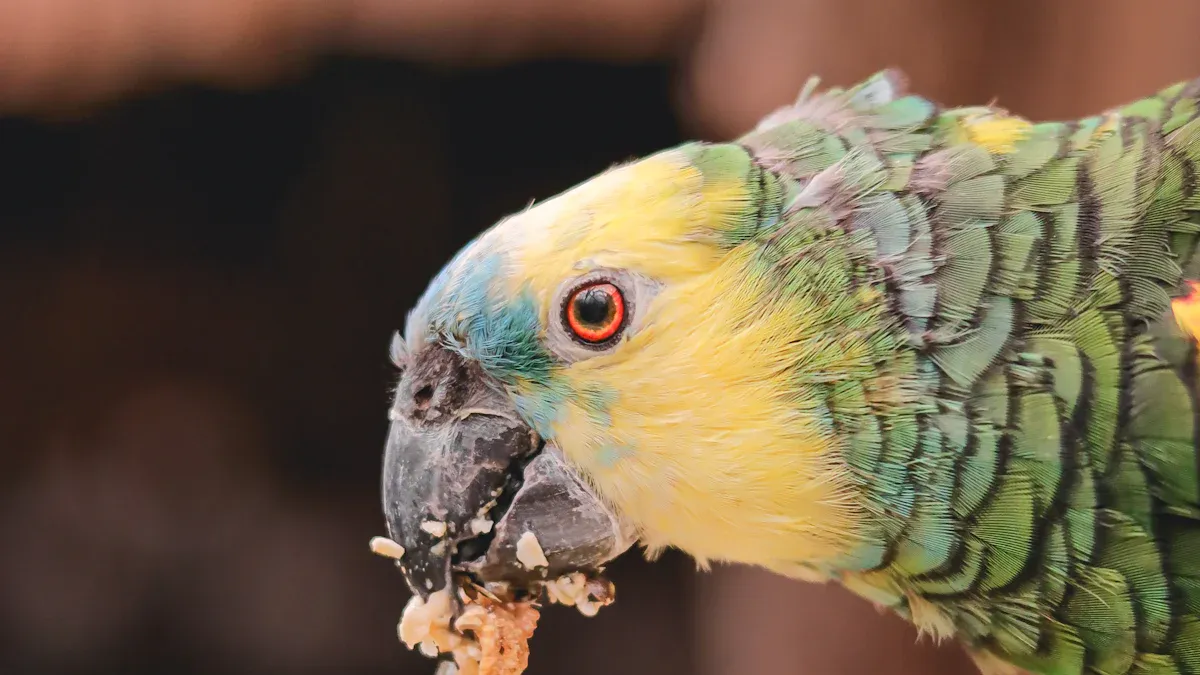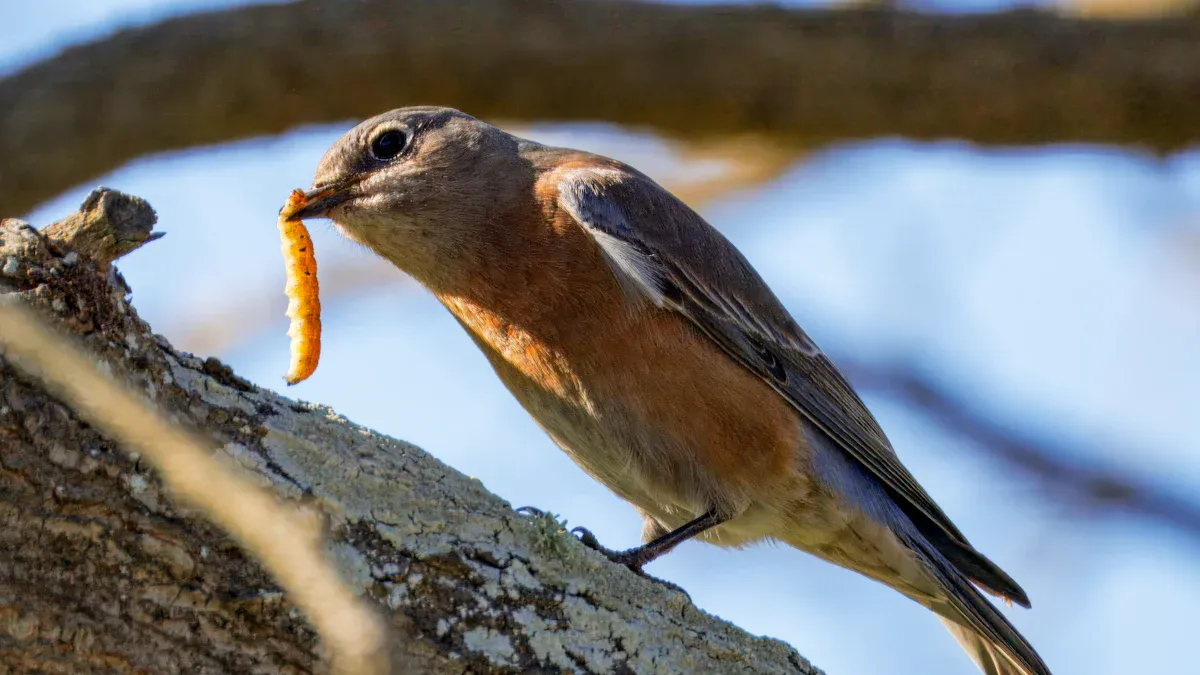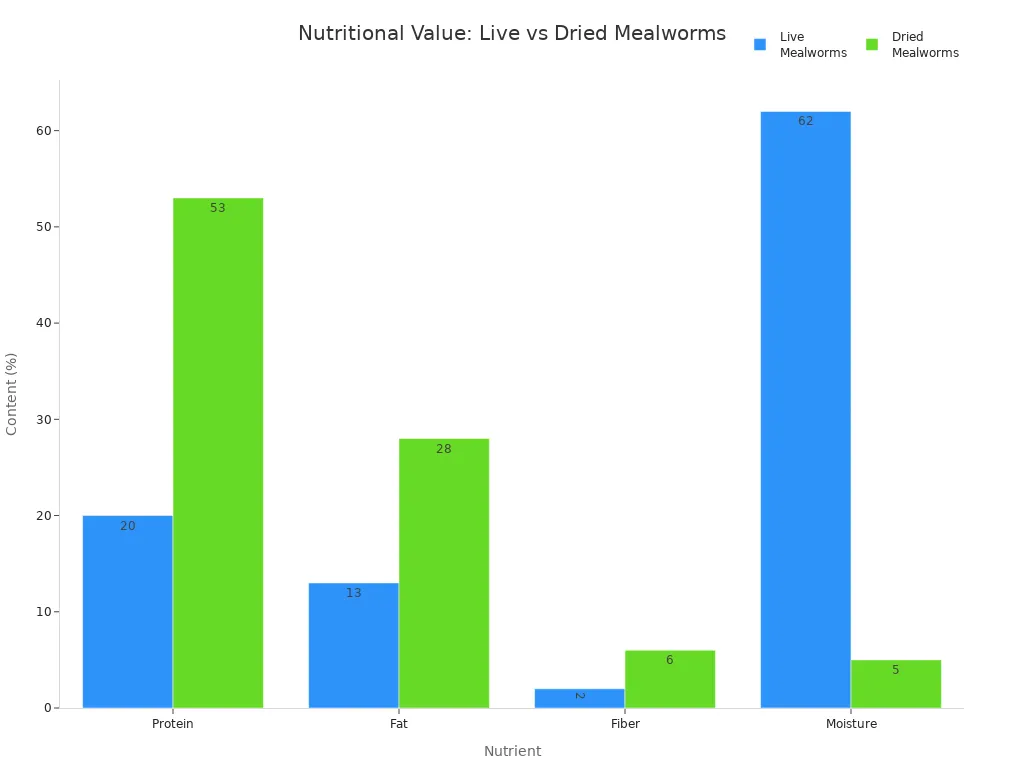
Bird Dried Mealworm Topping offers an easy boost for backyard birds. This treat delivers valuable nutrients birds need for energy, strength, and feather health. When food in nature runs low, Bird Dried Mealworm Topping helps birds stay active and thrive. Healthy birds bring more life and color to any garden.
Key Takeaways
- Bird Dried Mealworm Topping provides high protein, healthy fats, and fiber that help birds grow strong, stay energetic, and maintain shiny feathers.
- Offering mealworms supports many birds like songbirds, migratory visitors, and nesting parents by boosting their energy and improving survival rates.
- Use tray or dish feeders to serve mealworms, mix them with seeds for variety, and store them in airtight containers to keep them fresh and safe.
Bird Dried Mealworm Topping: Nutritional Benefits
High Protein for Growth and Energy
Birds need protein to stay strong and active. Protein helps birds build muscles, repair tissues, and grow healthy feathers. During spring, birds use extra energy for nesting and raising chicks. In winter, they need more protein to keep warm and survive cold nights. Bird Dried Mealworm Topping gives birds a rich source of protein that supports their daily needs. Many wild birds, such as robins and bluebirds, love this topping because it helps them stay energetic and healthy.
Tip: Adding protein-rich foods to feeders can help birds recover after long flights or tough weather.
Healthy Fats for Feather and Skin Health
Fats play a key role in keeping birds’ feathers shiny and their skin healthy. Birds use fats as fuel for flying and staying warm. Healthy fats also help birds grow strong, waterproof feathers. Bird Dried Mealworm Topping contains natural fats that support these needs. Birds with enough fat in their diet show brighter colors and better feather condition. This makes them more attractive and helps them survive in the wild.
- Fats help birds:
- Stay warm in cold weather
- Grow smooth, glossy feathers
- Store energy for migration
Natural Fiber for Digestive Support
Fiber keeps a bird’s digestive system working well. Birds need fiber to move food through their bodies and absorb nutrients. Bird Dried Mealworm Topping provides natural fiber that supports healthy digestion. Birds with good digestion can get more energy from their food and stay active all day. Fiber also helps prevent stomach problems and keeps birds feeling full and satisfied.
A balanced diet with protein, fats, and fiber helps backyard birds thrive. Bird Dried Mealworm Topping offers all these benefits in one easy-to-serve treat.
Bird Dried Mealworm Topping: Which Birds Benefit Most
Insect-Eating Songbirds
Many backyard songbirds rely on insects for their daily nutrition. Birds like bluebirds, wrens, and robins often search for protein-rich insects to fuel their active lives. Bird Dried Mealworm Topping provides a convenient and reliable source of protein that matches what these birds find in nature. When natural insects become scarce, this topping helps songbirds maintain their energy and vibrant plumage. Gardeners who offer this treat often notice more colorful and lively birds visiting their feeders.
Note: Songbirds with access to high-protein foods show stronger songs and brighter feathers, making gardens more cheerful.
Seasonal Visitors and Migratory Birds
Seasonal visitors and migratory birds face unique challenges during their journeys. They need extra energy to travel long distances and adapt to new environments. Studies show that mealworms can influence the gut health of migratory birds, helping them adjust to dietary changes during stopovers. Birds that eat mealworms develop a gut microbiome better suited for digesting protein, which supports their strength and stamina. By offering Bird Dried Mealworm Topping, backyard bird lovers can support these travelers and help them recover quickly during migration.
Nesting Parents and Young Chicks
Nesting season demands more from parent birds and their chicks. Parents need to find enough food to feed themselves and their growing young. Young chicks require protein to grow strong bones, muscles, and feathers. Bird Dried Mealworm Topping supplies the nutrients needed for healthy development. When parents have easy access to this topping, they can feed their chicks more efficiently, leading to higher survival rates and healthier fledglings.
- Benefits for nesting birds:
- Faster chick growth
- Stronger, healthier fledglings
- More successful nesting seasons
Bird Dried Mealworm Topping: Supporting a Natural Diet
Mimics Wild Food Sources
Birds in the wild search for insects, worms, and other protein-rich foods. Bird Dried Mealworm Topping closely matches the nutrition birds get from their natural environment. When birds find mealworms in feeders, they recognize a familiar food. This topping encourages natural foraging behavior and helps birds stay active. Many species, such as robins and bluebirds, prefer mealworms because they taste and feel like the insects they hunt outdoors.
Tip: Offering foods that mimic what birds eat in nature can attract a wider variety of species to the garden.
A table below shows how dried mealworms compare to common wild foods:
| Food Type | Protein | Fat | Fiber |
|---|---|---|---|
| Dried Mealworms | High | Moderate | Moderate |
| Caterpillars | High | Low | Low |
| Seeds | Moderate | High | Low |
Helps Birds During Food Shortages
Natural food sources can run low during cold months or dry spells. Birds often struggle to find enough insects and worms. Bird Dried Mealworm Topping provides a reliable solution. When birds face shortages, this topping supplies the nutrients they need to survive and thrive. Gardeners who offer mealworms help birds maintain energy and health, even when nature cannot provide.
- Benefits during shortages:
- Birds stay strong and active
- More birds visit feeders
- Higher survival rates in winter
Bird lovers who use this topping support local wildlife and enjoy a lively, healthy backyard.
Bird Dried Mealworm Topping: Safe and Effective Serving Tips

Choosing the Right Feeder
Selecting the right feeder helps birds enjoy their mealworms safely. Tray feeders and dish feeders work best for dried mealworms. These feeders keep the food visible and easy to reach. Mesh feeders also allow air to flow, which keeps mealworms dry and fresh. Place feeders in a quiet spot, away from heavy foot traffic. Birds feel safer and visit more often when feeders sit near shrubs or trees.
Tip: Clean feeders regularly to prevent mold and keep birds healthy.
Mixing Mealworms with Other Foods
Birds love variety in their diet. Mixing mealworms with seeds, nuts, or suet attracts more species to the garden. Some birds prefer mealworms alone, while others enjoy a blend. Try adding mealworms to your usual seed mix. This combination gives birds extra protein and energy. For a special treat, lightly coat mealworms with a drop of olive oil. This step adds moisture and makes the mealworms even more appealing.
- Mix with:
- Sunflower seeds
- Peanuts
- Suet pellets
Serving Size and Frequency
Offer mealworms in small amounts at first. Start with a handful each day. Watch how quickly birds eat them. If birds finish the mealworms fast, add a little more next time. Too many leftovers can attract pests. Adjust the serving size based on the number of visitors. During nesting season or cold weather, increase the amount to support extra energy needs.
| Season | Suggested Amount per Day |
|---|---|
| Spring | 2-3 tablespoons |
| Summer | 1-2 tablespoons |
| Winter | 3-4 tablespoons |
Note: Fresh food keeps birds coming back. Refill feeders daily for best results.
Bird Dried Mealworm Topping: Storage and Freshness
Keeping Mealworms Dry and Safe
Proper storage keeps dried mealworms fresh and safe for birds. Moisture can cause mealworms to spoil or grow mold. Store them in a cool, dry place away from direct sunlight. Use airtight containers to block out humidity and pests. Many bird lovers choose resealable bags or plastic tubs with tight lids. Place the container on a shelf, not on the ground, to avoid dampness. Always check for signs of moisture or insects before serving.
Tip: Clean storage containers regularly to prevent bacteria and keep mealworms in top condition.
Shelf Life of Dried Mealworms
Dried mealworms last much longer than live insects. When stored correctly, they can stay fresh for several months. Most packages include a best-by date. Use this as a guide, but always check the mealworms before feeding. Fresh mealworms look golden and crisp. If they appear dark, soft, or have an odd smell, replace them. Feeding birds only fresh mealworms supports their health and keeps them coming back.
A quick reference table for storage:
| Storage Method | Expected Freshness |
|---|---|
| Airtight container | 6-12 months |
| Open bag | 1-2 months |
| Exposed to moisture | Less than 1 month |
Note: Store only what birds can eat in a few weeks to ensure the best quality.
Bird lovers see many benefits when they add dried mealworms to feeders:
- Simple to serve and mix with seeds.
- Packed with protein, fat, and fiber for bird health.
- Matches birds’ natural food instincts.
- Attracts more bird species.
- Easy to store and maintain.
| Nutrient | Live Mealworms (%) | Dried Mealworms (%) |
|---|---|---|
| Protein | 20 | 53 |
| Fat | 13 | 28 |
| Fiber | 2 | 6 |
| Moisture | 62 | 5 |

Try this nutritious topping to help backyard birds thrive all year.
FAQ
What types of birds enjoy dried mealworm topping?
Many birds love dried mealworms. Bluebirds, robins, chickadees, wrens, and woodpeckers visit feeders more often when this topping is available.
How often should someone offer dried mealworm topping?
Daily feeding works best. Adjust the amount based on how quickly birds finish the mealworms. Fresh servings attract more birds and keep them healthy.
Can dried mealworm topping be mixed with other foods?
Yes! Mixing mealworms with seeds or nuts creates a balanced meal. Birds get more nutrients and variety, which helps them stay strong and active.


